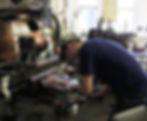In 1865 Gillinder Glass was established, and they opened a glass pressing factory in Pittsburgh, Pennsylvania. This was only forty years after John P. Bakewell invented the first commercial glass-pressing machine. Blackwell’s invention “quickly led to the mass production of glassware and greatly reduced its cost, leading to glassware being available for everyday use.*
Today, Gillinder Glass still hand presses every piece of glass they manufacture. Advances in technology and greater customer demand has allowed Gillinder to start utilizing automated equipment for glass pressing and maximizing efficiencies. Glass pieces are generally made by pouring the molten glass into a mold and having a “plunger” pressed into the iron base. Almost all Gillinder’s molds are made from ductile iron, but some may require an A-2 tool steel or stainless steel may be used.

Today, as an ISO 9001:2015 certified company, Gillinder’s Port Jervis factory is held to high standards of manufacturing quality and the in-house mold shop is no exception. Gillinder’s mold shop can collaborate with customers in designing new custom molds or refurbishing existing ones. Gillinder Glass has the capability to manufacture with customer’s existing hand pressed molds. Machine pressed molds can be used by making adjustments to be compatible with current equipment.
Mold Shop supervisor, Lewis Still, explains, “Molds that run constantly usually need nothing more than a simple polishing, but sometimes they do need repair work. Average life span on mold equipment is about 5 years. After that, the tooling will start to develop what we call “fire cracks” which are stress fractures in the material from constantly being hot and cold.” Molds are housed in a special atmospherically controlled storage area and maintained in pristine condition after each use to ensure consistent production of the highest quality glass.
Gillinder also has the ability to do prototyping and programing. In addition to working with almost all current software systems, the mold shop is equipped with:
· Fadal Computer Controlled Vertical Milling Center 3016L
· Computer Controlled Bridgeport Horizontal Lathe
· Bridgeport Series 2 Vertical Milling Machine
· LeBlond Horizontal Lathe
· TUR 63 Lathe
· Welding and Braising Shop (including gas spray welding)
Gillinder has created molds for an array of products including headlights, traffic lights, dog food bowls, kitchenware, and even dental cuspidors.
In the Spring of 2022, to further expand the Mold Shop’s capabilities, Gillinder is acquiring an additional CNC milling machine. The CNC milling machine precisely cuts molds from various design software to meet customer’s expectations in design and specification.
To find out more about Gillinder's mold shop contact:
Call (845) 856- 5375 or email info@gillinderglass.com
---
For other inquiries, please call us at 845-856-5375 or email at info@gillinderglass.com
